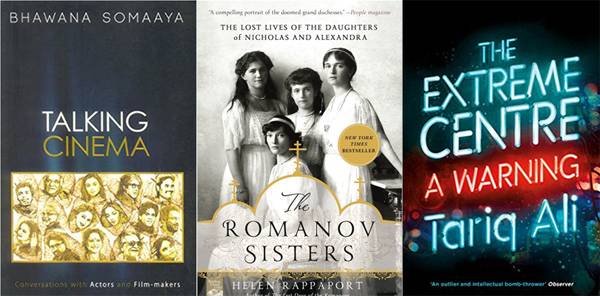
EDITOR’S PICK
The Romanov Sisters: The Lost Lives of the Daughters of Nicholas and Alexandra
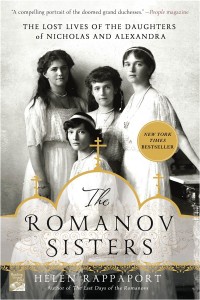
Helen Rappaport
St. Martin’s Griffin, 2015
PRs 1,895
They were the Princess Dianas of their day – perhaps the most photographed and talked about young royals of the early twentieth century. The four captivating Russian Grand Duchesses – Olga, Tatiana, Maria and Anastasia Romanov – were much admired for their happy dispositions, their looks, the clothes they wore and their privileged lifestyle.
Over the years, the story of the four Romanov sisters and their tragic end in a basement at Ekaterinburg in 1918 has clouded our view of them, leading to a mass of sentimental and idealized hagiography. With this treasure trove of diaries and letters from the grand duchesses to their friends and family, we learn that they were intelligent, sensitive and perceptive witnesses to the dark turmoil within their immediate family and the ominous approach of the Russian Revolution, the nightmare that would sweep their world away and them along with it.
The Romanov Sisters sets out to capture the joy as well as the insecurities and poignancy of those young lives against the backdrop of the dying days of late Imperial Russia, World War I and the Russian Revolution. Rappaport aims to present a new and challenging take on the story, drawing extensively on previously unseen or unpublished letters, diaries and archival sources, as well as private collections.
What people are saying: “The public spoke of the sisters in a gentile, superficial manner, but Rappaport captures sections of letters and diary entries to showcase the sisters’ thoughtfulness and intelligence” (Publishers Weekly).
The Extreme Centre: A Warning
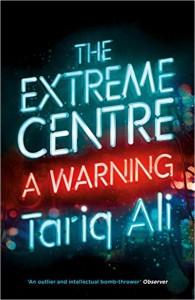
Tariq Ali
Verso, 2015
PRs 1,295
Britain’s leading radical delivers an eviscerating attack on the indistinguishable political elite of the UK.
What is the point of elections? The result is always the same: a victory for the Extreme Centre. Since 1989, politics has become a contest to see who can best serve the needs of the market – a competition now fringed by unstable populist movements. The same catastrophe has taken place in the US, Britain, Continental Europe and Australia.
In this urgent and wide-ranging case for the prosecution, Tariq Ali looks at the people and the events that have informed this moment of political suicide: corruption in Westminster, the failures of the EU and NATO, the soft power of the American Empire that dominates the world stage uncontested.
Despite this inertia, Ali goes in search of alternative futures, finding promise in the Bolivarian revolutions of Latin America and at the edges of Europe. Emerging parties in Scotland, Greece and Spain, formed out of the 2008 crisis, are offering new hope for democracy.
The Punjab Story
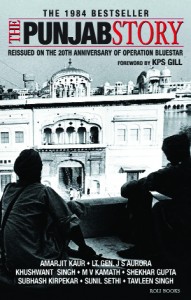
Foreword by K P S Gill, with chapters by Khushwant Singh, Amarjit Kaur, Tavleen Singh, Shekhar Gupta, M V Kamath and Sunil Sethi
Roli Books, 2005
PRs 550
6 June 1984. The Indian Army storms the Golden Temple in Amritsar. Called Operation Bluestar, the historic and unprecedented event ended the growing spectre of terrorism perpetrated by the extremist Sikh leader Jarnail Singh Bhindranwale and his followers. But it left in its wake unresolved political questions that continued to threaten Punjab’s stability for years to come. How, in the brief span of three years, did India’s dynamic frontier state become a national problem? Who was to blame: the Central Government for allowing the crisis to drift, despite warnings, or the long-drawn-out Akali agitation, or the notorious gang of militants who transformed a holy shrine into a sanctuary for terrorists?
First published two months after Operation Bluestar, The Punjab Story pieces together the complex Punjab jigsaw puzzle through the eyes of some of India’s most eminent public figures and journalists. Writing with the passion and conviction of those who were involved with the drama, they present a wide-ranging perspective on the past, present and future of the Punjab tangle in India.
Talking Cinema: Conversations With Actors and Directors
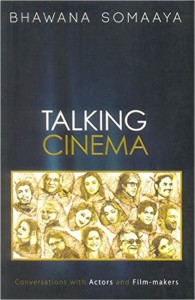
Bhawana Somaaya
HarperCollins India, 2013
PRs 650
Talking Cinema: Conversations With Actors and Directors takes a look into the “reel” lives of film personalities. It tries to answer questions about how actors prepare themselves for specific roles and examines their intellectual and emotional state of mind as they slip in and out of character. The author has documented conversations with some of the film industry’s most famous stars to provide an insider’s view of and insight into the world of film – far removed from designer clothes, makeup and glycerine teardrops.
The section “An Actor Prepares” focuses on how performers ready themselves for a role. “Character Speak” looks at the research that has gone into developing some of the most critically acclaimed characters to have appeared on Indian movie screens. “Director’s Cut” moves away from performers and deals with filmmakers, and “The Specialists” analyses why particular directors or actors might associate themselves with a certain genre of films or characters.
A Princely Affair: The Accession and Integration of the Princely States of Pakistan, 1947–1955
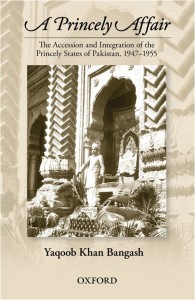
Yaqoob Khan Bangash
Oxford University Press, 2015
PRs 1,595
West Pakistan, on 15 August 1947, was less than half its present size. Nearly a year of negotiations, arguments, threats, and even chance, brought nine princely states into the Pakistani fold. Thereafter followed a long and staggered process of integration.
Using hitherto unused and inaccessible primary sources, this path-breaking book completes the story of the creation of Pakistan. In charting the accession and integration of the princely states, this book shows, for the first time in detail, the complicated and often botched processes of the early consolidation of Pakistan. The problems emanating from this early period, haphazard constitutional integration, weak local political forces, the insurgency in Balochistan since 1948, and a weak sense of national identity and citizenship remain with Pakistan today.
What people are saying: “While there is a considerable body of literature on the accession and integration of the princely states to the Indian Union, hardly anything comparable exists on the Pakistani side of the story. Rectifying this imbalance in South Asian historiography, Yaqoob Khan Bangash makes a welcome contribution to the literature on state formation in Pakistan with significant comparative insights on why it differed so markedly from the Indian experience. Based on hitherto unused archival sources, he tells the important but untold story of Pakistan’s former princely states with clarity and rare insights” (Ayesha Jalal, Tufts University).

